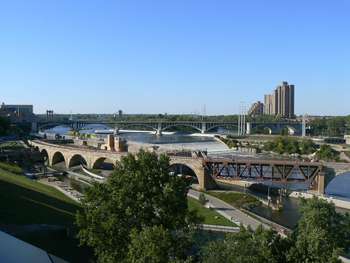Bill to force hydropower project falls flat

St. Anthony Falls Historic District in Minneapolis
Last month a bill (SF 840) was introduced in the Senate that would require local governments to lease public land, including parks, for development and operation of any hydroelectric facility of 100 megawatts or less, provided the hydroelectric company has been granted a license from the Federal Energy Regulatory Commission (FERC). The bill was pulled by the author after the Minneapolis Park Board, citizens and other stakeholders, including FMR, cried foul about what would amount to a blatant taking of public property.
Crown Hydro, a company that seeks to build a hydroelectric facility on parkland in the Saint Anthony Falls Historic District in Minneapolis, put the bill forward. Crown Hydro received a FERC license in the late 1990s for its original proposal to build the facility in the Crown Roller Mill building. Since that deal fell through nearly a decade ago, the company has continued to make investments in the project and has been pursuing alternatives that would site the facility in Mill Ruins Park.
These efforts have largely been rebuffed by the Minneapolis Park Board, which voted last year to reject a proposal to conduct an Environmental Assessment Worksheet and to establish a Citizen Advisory Committee for the project, all of which would have been paid for by Crown Hydro. Local citizens of the downtown riverfront area, including former Vice President Walter Mondale, have been advocating against the controversial proposal on the grounds it would irreversibly damage historic resources of local, state and national significance.
The introduction of Senate File 840 was a strong-arm approach that raised the ire of many stakeholders. In response to concerns and claims of misinformation, Rep. Bill Hilty, chair of the House Energy Finance Committee, pulled together an ad hoc public hearing to discuss the project and the bill. Sen. Linda Higgins and Rep. Bobby Joe Champion, who represent downtown Minneapolis were present, along with Sen. Kenneth Kelash, chief author of the bill, and a handful of other interested legislators.
The hearing room was packed and virtually everyone who testified (other than Crown Hydro) spoke against the bill. FMR testified against the taking of public land in the river corridor and expressed concerns that the law could have negative implications for other rivers in the state. The City of Minneapolis, Minneapolis Park Board, Minnesota Historical Society and the National Park Service all spoke against the bill.
The testimony of the Park Board and several local citizens shed some light on the controversy, but it was the grilling of Crown Hydro representatives by legislators that exposed the truth about the role bad business decisions have played in Crown Hydros plight. After an hour and a half of testimony, Sen. Kelash closed the meeting by announcing he would pull the bill.
The bill died swiftly, but Crown Hydro does not appear ready to give up. Local citizens are vigilantly keeping an eye on the project, unsure of what lengths the company will go to next.